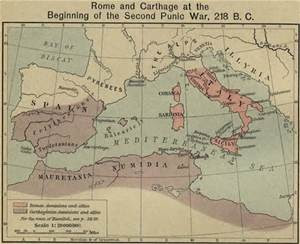See here.
Timelines
(i) Roman victory.
(ii) Carthaginian victory.
(iii) Restored Roman victory.
This situation is more complicated than I had thought.
Two Neldorians travel pastward from the 205th millennium in order to change the course of the Second Punic War. Because they succeed, they depart from the 205th millennium of timeline (i) but arrive during what comes to be called the Second Roman War of timeline (ii).
Manse Everard and Piet van Sarawk travel futureward from the Pleistocene lodge in order to arrive in New York, 1960. Because the Neldorians have succeeded, Manse and van Sarawak depart from the Pleistocene lodge in timeline (i) and arrive in the equivalent of New York in the year 5964 from the creation of the world (as it is believed) in timeline (ii).
Remaining within timeline (ii), the two Patrolmen travel pastward to the lodge, then to the Academy. After some exploratory futureward journeys by other agents, Manse and Everard lead a team to the Battle of Ticinus to restore Roman victory in the war against Carthage. Because they succeed, they depart from the Academy in timeline (ii) but intervene in the Battle of Ticinus in timeline (iii).
In timeline (i), Manse and van Sarawak have simply disappeared, never to be seen again, on a shared timecycle in the Pleistocene lodge. In the previous post, I hypothesized that Patrol HQ in each of their home milieus would send an agent to the lodge to investigate their disappearance. I further hypothesized that, because they were investigating what had happened to Manse and van Sarawak, each of these agents would also arrive in timeline (ii). In that case, they also would have disappeared forever from timeline (i).
In any case, I think that Patrol theoreticians and Danellians in timeline (i) would deduce what had happened. These guys have disappeared into another timeline. We can't get them back but their fate does not affect our timeline. It is the equivalent of missing (not killed) in action or a ship lost at sea. To be regretted but not affecting anything else.

No comments:
Post a Comment